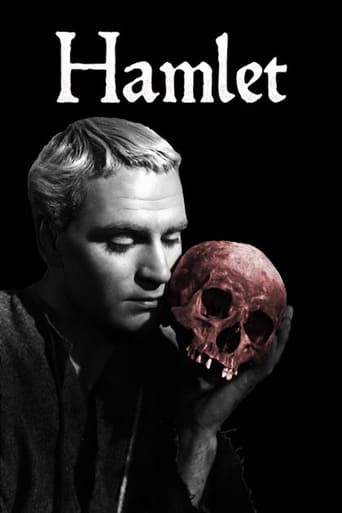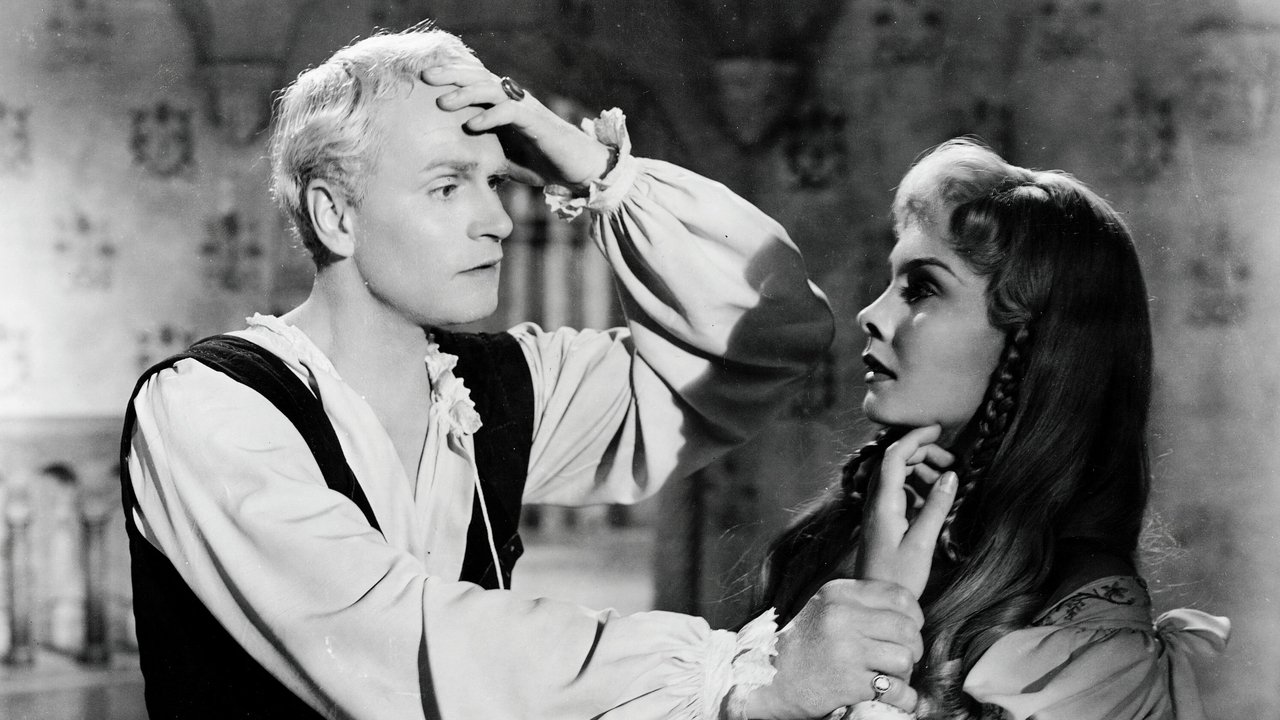ethanct86
It can't get better than Hamlet. Maybe the most-quoted English piece of all time, Hamlet is a delicate piece that needs to be done right. In his 1948, black and white, Best Picture-winning Hamlet, Olivier delivered an adaptation that hung close to the letter and spirit of the original source, but didn't dare to fly free. It certainly grasped the mood Shakespeare wanted, but it doesn't take filming freedoms where the text allowed. Certainly, he achieved the most freedom from the stage through the cinematography, most noticeably the unique camera movements imitating the sound of a heartbeat that plays when the dead king's ghost is observed in anyway in the story.Hamlet feels more like a filmed version of the play rather than an adaptation. But at that, it is amazing. The dark presence and tragic undertones grow through Olivier's Oscar-winning lead performance and Jean Simmons's crazed Ophelia. As the narrator states in the beginning of film, "This is the tragedy of a man who could not make up his mind." In the play and film, Hamlet is visited by his father's (the former king of Denmark) ghost, stating that his uncle, now the king, had murdered him. However, Hamlet is unsure what action to follow, for if he murders his uncle, it would be repaying evil with evil. Unfortunately, a mistake causes Hamlet to be exiled to England, but he doesn't give up there, and the story builds up to a climatic ending.Like the play itself, Hamlet offers many questions but doesn't give any straightforward answers. The questions dive deep, and along with Shakespeare's old English, younger viewers might not understand. As with the play, an undercurrent topic of incest plays out, mostly through Hamlet's complaints against his uncle taking his father's widow as his wife. Furthermore, the ending is dramatic and sad – with a lot of dead people.Olivier, who has the skill to drop any obscure line of Shakespeare in a beat, manages to work a scarcely worthy adaptation of the play, despite having to cut many monologues and soliloquies in order to run under 160 minutes. One of the weak points of the film is Olivier's recitation of the famous soliloquy, "To be or not to be." To my disappointment, Olivier rushes through it with melancholy and something short of fake that it doesn't have much dramatic and emotional impact. The play did not have any rule or details that restricted it from emotional freedom, especially as a film. Olivier seems to restrict himself to rules that Shakespeare didn't put or intend. But otherwise, Olivier's Hamlet is extraordinary in its own right. He portrays it in the way Shakespeare might have imagined it – the non-extravagant set pieces, simply choreographed and bloodless duels, and few, select locations for different scenes. For the sources and educational material, Olivier's Hamlet is worth watching, but only for the artistic value of the spirit and letter of Shakespeare.
thinker1691
Among the great plays supposedly written by William Shakenspear, but are in actuality attested to by modern scholars as being written by Edward DE Vere, the 17th Earl of Oxford is this Play called " Hamlet. " The play performed on Stage and later adapted to the Silver Screen, is highlighted as the supreme accomplishment of the writer. First performed in 1948 by the late great Lawrence Olivier is of such magnitude, it later received Monumental honors as to mark him as the greatest Shakespearean of the era. The gist of the story is of a lonely depressed Danish prince named Hamlet (Lawrence Olivier) who is sorely troubled by the untimely death of his father and the otherwise hasty remarriage of his mother. So troubled is he that he along with other friends, begin to experiencing ghostly apparitions of his late father. Convinced that his father's death was no accident, Hamlet sets about to avenge his father's death which results in a the accidental death of Polonius, chief counselor to the king. From there on, everyone assumes that Hamlet has gone complete mad, further resulting in his banishment to England and the death of Ophelia (Jean Simmons). The movie was filmed in Black and White to the wishes of the director and star of the film. To date few actors have garnished as many accolades as has Olivier. Although the film is listed a bit long, it was indeed originally longer until edited by Olivier. Many actors got their beginning in this movie. Among them are the following. Anthony Quayle, Peter Cushing and Christopher Lee. Any collection of great films is not complete without this movie. Recommended to one and all. ****
MissSimonetta
When shown in my Shakespeare on Film class last semester, this version of Hamlet did not play well. My classmates laughed at several of Olivier's dramatics, Jean Simmons' overdone Ophelia, and the ghost which they considered "campy". They came to the conclusion that the film was badly dated and, as one girl put it, "Laurence Olivier couldn't act his way out of a paper bag". That statement's a bit ridiculous and my classmates showed a great deal of immaturity, but I will say even I was disappointed with this version of Hamlet.It's a good movie no doubt about that: Olivier was right to shoot the film in black-and-white as it adds to the foreboding atmosphere. The sets are minimalist, which might come across as stagey to some but I think it added to the mood. The transitions are remarkable tracking shoots that go through the shadowy labyrinth that is Elsinore Castle, reflecting Hamlet's indecisive state of mind. The overall feel reminded me of a German expressionist film from the 1920s, and I enjoyed that very much.As far as adaptations go, this one slims down the text significantly. Most notably, the political aspect of the play is eradicated, and Rosencrantz and Guildenstern make no appearance. The whole movie runs two and a half hours. I honestly had no problem with how the play was adapted. Olivier still covers the major themes of the original, so a few subplots getting cut did not offend me too much.Olivier's interpretation of the title character did not impress. His Hamlet is much too inactive. No one denies that Hamlet is an introspective fellow, but Olivier seems to have forgotten he is an impulsive man as well. Poor Jean Simmons is miscast as Ophelia and gives the weakest portrayal in the film. She obviously had no clue what she was doing. Honestly, Olivier would have been better off casting his wife Vivien Leigh, an amazing actress who had much experience dealing with Shakespeare. Everyone else does fine in their parts, though no one really stands out.This film's influence cannot be denied and despite all my criticism, this is worth seeing. The cinematography and atmosphere are stunning (these two elements are what make the film for me), but I cannot say this is the definitive Hamlet.
sashank_kini-1
Reading Shakespeare is not an easy job. Not only do many readers get confused with the Old English, paranoid with the mythological references and cryptic metaphors and at times, tired with the flowery style, but also get bogged down by the lack of sympathy with the characters. I feel that Shakespeare is not one of my favorite writers, even though I do admire his Midsummer Night's Dream, Hamlet and The Tempest. I would rather read the Oedipus trilogy by Sophocles because there is an imminent tension in the play. Shakespeare relies more on grand and sometimes arcane soliloquies – there is so much he is telling but he deliberately wraps it so that interpretations may differ. I revere this quality, it makes him a genius and gives great pleasure to analyze his play but to read his plays for leisure is something I wouldn't really be interested.I read Hamlet first when I was 16; it was a magnum opus but I couldn't grasp its immense power. On viewing this film after almost 3 years, I noticed one thing about the play. The character of Hamlet is purposely given less characterization so that the reader/the actor may interpret him in his own way. In Oedipus the King, one can get a clear picture of Oedipus' torment not only by his dialogs but also by the singular focus of the play. Hamlet, however leaves up to the readers to decide how Hamlet really is or can be. Therefore, he is given such monologues and scenes that reveal the physical and part psychological element of the play but not in entirety. Even now, a writer/director can twist Hamlet's tale by putting in new conditions – that's one special virtue of the play.I still am puzzled about the ghost in the play. How is it that the guards, Horatio and Hamlet are able to see it while Gertrude cannot? This is the apparition of Hamlet's dead father, who wanders the castle at night and vanishes with the crowing of the cock. Hamlet, the Prince of Denmark mourns his father's untimely demise and scorns his mother's incestuous marriage with his uncle. After an encounter with the spirit who informs Hamlet about Claudio, his uncle's spineless deed, the prince feigns madness to extract vengeance.Acting wise, Laurence Olivier gives the most unaffected performance that works most of the times, except when Hamlet has to feign madness. Olivier seemed too calm to look or sound mad. Eileen Herlie is very convincing as Hamlet's mother, generating the right passion and perplexity for her character. Her scene with Hamlet in her room is very well acted by both the actors. Basil Sydney as Claudius was good but his character's motives remained unclear on a deeper level. Jean Simmons played her part well, but again, I didn't care much for her Ophelia. Here is where I am confused whether the actors are not truly reaching the depth of their characters or am I not yet floored by Shakespeare? Terence Morgan was the bad apple here.The film has a theatrical feel throughout; I could see many stage techniques applied, especially 'emphasis'. But Olivier brings a great camera technique during the ghost encounters where the sound of drum beat / heart beat is heard and the camera zooms in menacingly. But I was unimpressed with a few aspects in the film. For example, the somewhat forgettable 'Be not too tame but let your discretion
.' soliloquy. The scene with the actors where Claudius guiltily storms off was rushed and should have been shot in an elaborate, more Hitchcockian style. And the "man who cannot make up his mind" is vague. On a positive note, the scenes between Hamlet and ghost, Hamlet and mother and Ophelia, and the final scenes are shot and acted very well. The best part is that the play is much easier to understand and the script has been well adapted here.Most people consider "To be or Not to be" to be the definitive quote. My personal favorite, the one which can be said for olden tragedies is "Divinity shapes our ends. Rough-hew them how we will" And Olivier says it marvelously.My Rating: 7 out of 10


 AD
AD





